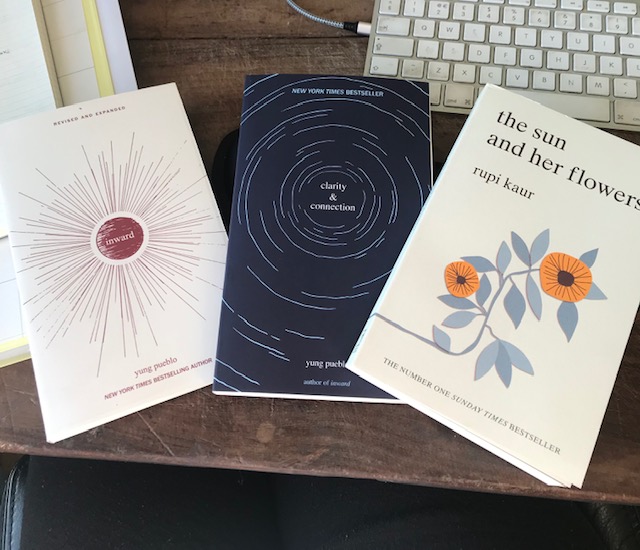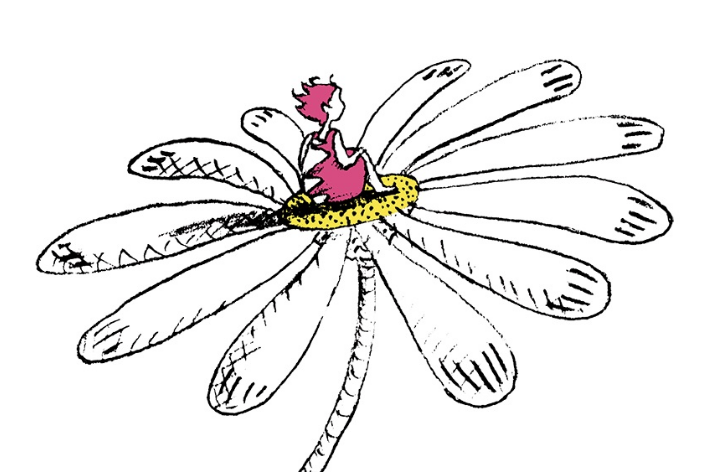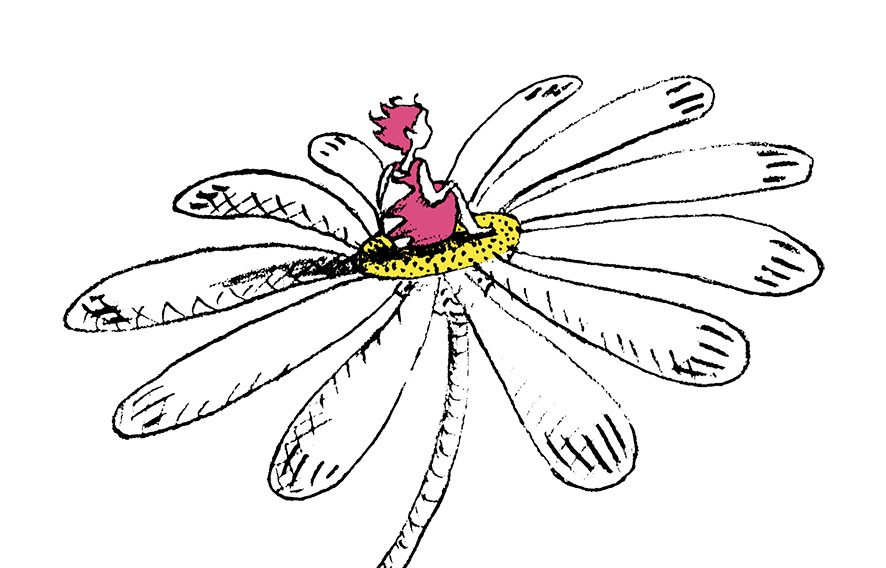Mindfulness News
Read about the benefits of mindfulness in everyday life. Find out more about our courses and latest news.
More Mindfulness

The new Daisy Garland series of More Mindfulness sessions launches later this month. In this series, we will be looking at the practice of mindfulness and its impact on our daily lives, tackling subjects such as fear, stress, perfectionism, and bad habits - to name just a few. Our weekly poetry inspiration this season comes from New York Bestselling author Yung Pueblo and Sunday Times Bestseller, Rupi Kaur.
I look forward to sharing these sessions with you all at Daisy Garland and exploring how mindfulness can help calm our nerves and steady our path. x
New Mindfulness In Action Course For January 2022

Mindfulness is a form of attention training. It encourages us to pay attention in a particular way - on purpose, in the present moment, non-judgementally and with kindness to ourselves.
In this new 6-week course, you will learn how to practise mindfulness and experience some of its many benefits. Learn more about how mindfulness can impact your ability to pay attention, improve the quality of your sleep, reduce worry and anxiety and calm an inner critical voice.
Taught by Gillian Higgins, international barrister and mindfulness teacher, this Zoom-led course provides interactive opportunities, live practices and tailored course materials to suit your particular workplace environment.
Intended for beginners. Weekly handouts provided.
Session times: Mondays or Tuesday 8-8.50am, starting Monday 10th January 2022.
Duration: 50 minutes weekly.
Group Size: 10-25.
Email: Email Gill at everydaymindfulness@
The Daisy Garland Mindfulness Sessions
Week 6: The Self-Critical Voice and Scaffolding Your Practice

In the last week of this course, we examine the impact of mindfulness on the self-critical voice and consider how to keep motivated to practice in the weeks and months ahead.
In a recent article, "Living With, and Loving, Your Imperfect Life", Mark Bertin explains that "The Inner Critic is a particularly draining mental pattern. Like a playground tyrant, it’s an unrelenting heckler. It insults and judges mostly without reason—You’re not good enough. You should have done X or Y but definitely not Z again. Why do you bother? You’ll never get it right.”
“That voice is not about improvement, making amends, or fixing what needs fixing—ideas we want to build upon. The Inner Critic embodies mindless self-judgment that undermines our confidence, and, ultimately, our well-being, and affects all of our interactions with the world.”
“When we recognize the Inner Critic as nothing more than an entrenched mental habit, we shift ou...
The Daisy Garland Mindfulness Sessions
Week 5: Mindfulness and Sleep

This week’s theme was mindfulness and how it can help us to sleep better for longer. After exploring some of the common obstacles to getting a good night’s sleep, we looked at several mindfulness practices that can help to calm the body and soothe the mind. I have included a few links to similar practices for you to try this week below.
In essence, the practice of mindfulness helps us to activate our ‘rest and digest’ nervous system and encourages us to let go of worries, thoughts and rumination that often take hold when we want to sleep. As Dr Shelby Harris explains, “Mindfulness can quiet the brain and allow for deeper sleep…It can set the stage for sleep by allowing you to be more aware of your thoughts and to be able to let go of those anxieties instead of getting stuck on them.” She explains that “Strengthening your ‘mind muscle’ through daily practice helps you better recognise the negative insomnia-inducing thoughts and let them pass.” So pract...
The Daisy Garland Mindfulness Sessions
Week 4: Mindfulness, Anxiety and Worry

This week, we looked at how the practice of mindfulness can help to calm anxious feelings. We explored how mindfulness helps you learn to stay with difficult feelings without analyzing, suppressing, or encouraging them. And how the practice allows you to safely explore the underlying causes of your stress and worry. We also looked at how it can help to create space around your worries so they don’t consume you.
We touched upon the recurrent theme of how our thoughts are not facts. As Mark Williams explains, "When we meditate, we learn to become more discerning about the thoughts that arise and how we are going to react to them. We become more aware that while some thoughts are useful, others can be deceptive and unhelpful. By becoming more aware of the nature of our thoughts and their transience, we can start to protect ourselves from being highjacked, or negatively defined."
Williams also explains that "We become aware that often our t...
The Daisy Garland Mindfulness Sessions
Week 3: Challenges To Our Mindfulness Practice

This week we began the session with a reminder of the essence of mindfulness. Mark Williams tells us that "Mindfulness is a very simple form of meditation that was little known in the West until recently. A typical meditation consists of focusing your full attention on your breath as it flows in and out of your body. Focusing on each breath in this way allows you to observe your thoughts as they arise in your mind and, little by little, to let go of struggling with them. You come to realise that thoughts come and go of their own accord; that you are not your thoughts. You can watch as they appear in your mind, seemingly from thin air, and watch again as they disappear, like a soap bubble bursting. You come to the profound understanding that thoughts and feelings (including negative ones) are transient. They come and they go, and ultimately, you have a choice about whether to act on them or not."
When we start to practise mindfulness, ...
The Art of Disappearing by Naomi Shihab Nye
 When they say Don’t I know you?
When they say Don’t I know you?
say no.
When they invite you to the party
remember what parties are like
before answering.
Someone is telling you in a loud voice
they once wrote a poem.
Greasy sausage balls on a paper plate.
Then reply.
If they say We should get together
say why?
It’s not that you don’t love them anymore.
You’re trying to remember something
too important to forget.
Trees. The monastery bell at twilight.
Tell them you have a new project.
It will never be finished.
When someone recognizes you in a grocery store
nod briefly and become a cabbage.
When someone you haven’t seen in ten years
appears at the door,
don’t start singing him all your new songs.
You will never catch up.
Walk around feeling like a leaf.
Know you could tumble any second.
Then decide what to do with your time.
Photo by Annie Spratt on Unsplash
The Daisy Garland Mindfulness Sessions
 Week 2: Mindfulness, Paying Attention and More on Self-Compassion
Week 2: Mindfulness, Paying Attention and More on Self-Compassion
Thank you for joining Week 2 of The Daisy Garland Mindfulness sessions.
This week, we started to look at some of the practical benefits of developing a mindfulness practice, one of which is the ability to improve our focus and attention.
Many of us experience increasing levels of distraction and an inability to concentrate on any one thing for very long. Exposed to anxiety-creating headlines, worrying about loved ones or simply trying to keep your head when all about you are at risk of losing theirs, it’s no wonder many of us feel unable to focus. So how could mindfulness help?
Mindfulness is often described as a particular way of paying attention: On purpose, in the present moment, non-judgmentally (with kindness to yourself). Although the definition is simple, putting this into practice in daily life is often a challenge. So how might developing mindfulness help us to focus and pay attention? In essence, the pract...

